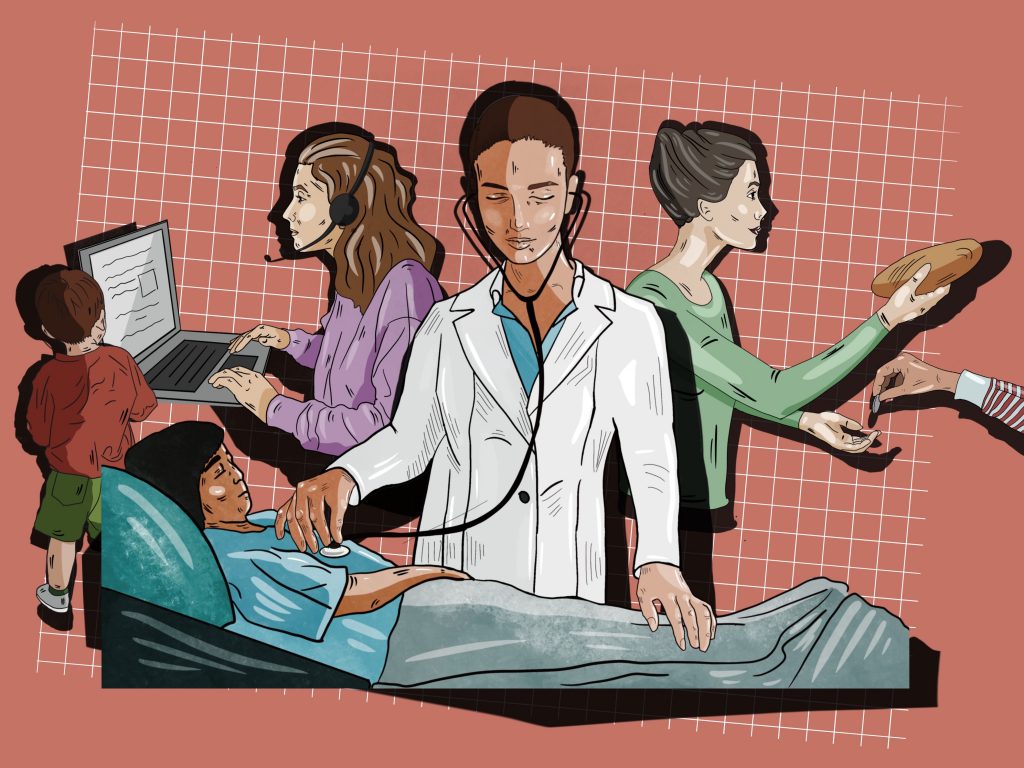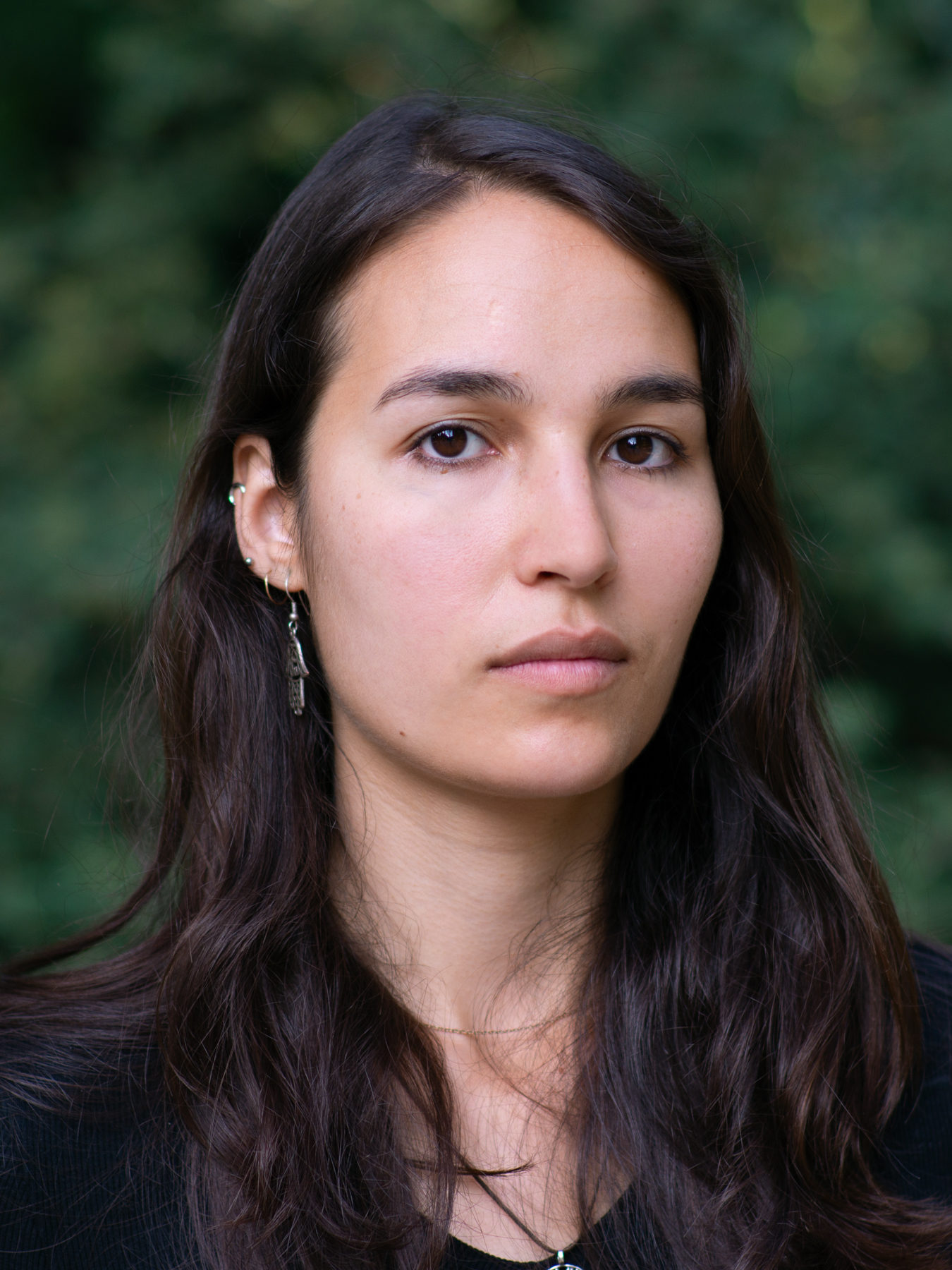The COVID-19 pandemic has brought new challenges to women workers in Georgia. Many have had to accept difficult working conditions to provide for their families. They often work a double shift, first at the job and then in the home. Three women share their experiences of life and work in the time of the coronavirus.
Irina Jugheli, 28, a doctor tells of how her professional responsibilities have changed since the start of the outbreak:
‘I’m a radiologist resident and I work in the emergency department, however, for safety reasons, these days we’re trying to consolidate as much as we can so less staff come to the clinic. So a lot of the responsibilities are new for me, for instance, we have rotating shifts in the reception room where we sort patients, which I was not involved in before.’
‘From 09:00 I’m on duty in full uniform, nowadays that includes a mask, face shield, gloves, and a disposable gown. During the day we admit patients of different intensities of illness.’
‘We work 24-hour shifts now, but if any doctor has a problem with transportation or any health issues, others might be asked to stay longer. I live close to the clinic so I know that I can be called to work anytime, even on my day off.’
‘I have always had one day off per week — but whereas before I knew I would be able to rest fully, now I only enjoy my rest while it lasts. I live with a friend who’s a colleague in the same hospital so we help each other around the house, and I’m lucky in that sense.’
‘Seventy percent of our staff is female, and you can see how in these times they are tenser than men. Together with their professional responsibilities, they also carry familial responsibilities — for their children and for the elderly.’
‘The moral exhaustion is far higher than the physical — we don’t receive a high number of patients but now they are more emotionally unstable, nervous, they complain more about the long waiting times and every day we have to explain the rules over and over again. The lines are longer because there are fewer administrative staff working now. Our workflow is ruined.’
‘On a personal level, we doctors are very mobilised and ready. We are also very happy and surprised with the public support we have received. The only thing that worries us is that we definitely don’t have enough inventory should the number of cases increase.’
‘They say it’s going to last anywhere between six months to a year and a half. Our real weapon is self-isolating as best we can.’
‘We all know very well that there are not enough resources to properly admit the difficult patients should the situation escalate. That’s why the measures that have been taken are indeed necessary. You might like them, you might not, but when you’re staying at home, it’s helping us. We’ll have a lot of infections, but the fact that there won’t be many difficult patients all at once gives me hope.’
‘You can start and end your whole career without seeing such a pandemic; I’d only seen it in movies before and never thought this would happen to me. At first, we didn’t take it seriously and we joked about it, but then I realised that it’s a simple reality and if I embrace it adequately, I’ll be prepared.’
‘I’m not scared of getting the virus. We [doctors] all know what has to be done, and I hope that we’ll have the resources to do everything properly until the end, so we can all survive this together.’
Nini Gvazava, 28, a sales associate and a mother of one-year-old on work and childcare:
‘My day starts at 07:00 when I wake up and quickly get myself ready because at 08:00 I already need to be at my mother’s place.’
‘We had to put my working computer there since I have to call dozens of people daily, and in our single room flat, it was either my daughter interrupting my calls or me interrupting her sleep with the noise. So my mother leaves and takes care of my daughter, while my husband and I work.’
‘My working day was until 17:00 for five days a week, but now I voluntarily work two more hours a day, six days a week for an additional salary. The employer didn’t press me — I chose it voluntarily. The thought that I might lose the job at any moment creates this pressure — we had a staff of 60 people, 50 of which are now on indefinite unpaid leave. I try to make as much as I can because I have these apocalyptic fears that I might become one of them.’
‘When my working day is done I walk back home to exchange places with my mother. We let go of our babysitter because she has a large family and I was concerned about safety. So when I come back, one hundred percent of me belongs to my daughter.’
‘I need to feed, change and bathe her, but those are the easy tasks. The real problem is that she has this unlimited, bottled-up energy that she can’t spend because she doesn’t go out anymore. She needs entertainment — and she’s not yet at the age when reading a book or watching something together would be enough.’
‘How can you entertain your child in a single-room flat? I’ve spent half of my last salary on new toys for her, so she could spend some energy on that, but she was bored with them after three days.’
‘I was thinking about taking her out at least a couple of times a week, but since these talks about the domestic transmission of the virus have started, my husband and mother became very concerned that she will touch something outdoors and get it. In my opinion, though, we are all just more stressed with this complete isolation. That’s the hardest part for me.’
‘At first, we were told it would be over in April, now they are talking about May and just thinking about the child being locked in the flat until August makes me panic. I have zero time for even realising what my own needs are, let alone meeting them. My only day off is completely occupied by entertainment for my daughter, and honestly, I’m running out of ideas. Sometimes we just take strolls across the flat hand in hand.’
‘I had a very busy life before too - when I came back from work, I would take my daughter to the park and we would have fun together, then come home and sleep. It was a completely acceptable lifestyle for me. I am healthy and capable, as always, but morally I’m worn out.’
‘My husband works with less intensity now and we don’t know if he’ll keep his job in the coming months. I might end up as our family’s only provider, and it’s my personal frontline now. I might have even less time for rest, but there’s nothing I can do about it. I’m lucky to have a job and a mother who helps me. As always, “like a man”, women in Georgia took on all the challenges.’
Salome [not her real name], 22, a shop assistant on working in the service sector:
‘I live in the suburbs, far away from the city centre, so after the state of emergency was announced, I was left without a means of transport and started to work in a small kiosk near my area.’
‘I work here [at the kiosk] in shifts with two of my female relatives, every third day. Before the curfew, we worked a 24-hour shift - from 10:00 till the same time next morning, but now we open at 6:30 and close 8:30. Before the pay was ₾40 ($12) a day, now it’s ₾20 ($6).’
‘We get paid every two weeks after the accounting is made.’
‘At work, I feel more or less protected, we’re being supplied with gloves and masks, we disinfect every surface, and have to measure our temperature every day. There are some marks [on the ground] in front of the shop [showing people where to stand] and people are generally well-behaved about the safety standards.’
‘However, when it was just the beginning and still I worked [at my previous job] in the cafe, a lot of tourists would come in, but I wasn’t aware of the danger. Now I wish I wouldn’t be so exposed. With the measures being taken now, I’m able to step over the fear — and even if I couldn’t, I wouldn’t have a choice. Debt and starvation can end you just as much as the virus.’
‘Our household is all-female and all of us work in the service sector. I’ve worked in this field after I finished school — everywhere from hotel reception to in a nightclub. I used to study in university but I ditched it because it was impossible to combine it with work.’
‘It’s even funny — now that we don’t have to spend money on transportation and don’t have any other responsibilities, it’s the first time in our family routine that we don’t have debts and the fridge is full. Also, for the first time since I finished school, I am truly enjoying my free time. I hardly had the luxury to spend so much time at home, for myself.’
‘There are many things I dislike about this job, but in this specific case by taking it I automatically agreed to all these bad conditions — otherwise I shouldn’t have applied. I have no choice at the moment, most of the shops in my area are closed.’
‘It’s my first time working in a shop like this [a small kiosk], and before I’ve never thought about details like, for example, the bathroom. It’s a big problem. There’s a construction site next to the shop and the workers dug a hole in the ground and somehow encased it with wooden planks, but the door to the bathroom doesn’t even close normally. I am lucky that the construction has now stopped and I can use this “bathroom”, because if it hadn’t, I’d be visible from the upper floors so I’d have to hold it in.’
‘I’m really hoping that this situation can help us move towards some kind of improvement. These days we’re talking about labour rights more. The only problem is that those people who are currently employed are scared to talk about the issues.
‘I wish that all of this would be assessed after the pandemic is over. I had many jobs in this sector and the situation is bad everywhere.’
This article was prepared with support from the Friedrich-Ebert-Stiftung (FES) Regional Office in the South Caucasus. All opinions expressed are the author’s alone, and do not necessarily reflect the views of FES.




 28 April 2020
28 April 2020




